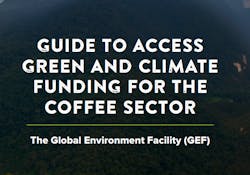Major New ICO Guide Published To Unlock Green And Climate Funding For The Coffee Sector
London, United Kingdom/Arlington, Virginia, United States (21 August 2018) – The International Coffee Organization (ICO) and the Sustainable Coffee Challenge are pleased to announce the publication of the Guide to Access Green and Climate Funding for the Coffee Sector: The Global Environment Facility (GEF).
This new Guide seeks to assist governments of coffee-producing countries to access Global Environmental Facility (GEF) funding in order to address coffee sector challenges. The GEF, in its new four-year replenishment cycle GEF-7 with an allocation of US$4.1 billion, has included coffee in the list of commodities eligible for funding. GEF-7 thereby provides an invaluable opportunity for countries to prioritize investments in development programmes that will not only enable sustainable coffee production, but also have a positive impact on nature conservation, as well on the livelihoods of coffee-producing communities.
“Actors from across the sector need to drive investments to help ensure the continued sustainability of coffee production in light of the pressing challenges presented by climate change," said José Sette, Executive Director of the International Coffee Organization.
“To date coffee projects received just US$32.8 million GEF funds, representing less than 0.2% of the total GEF funding pot, and US$223 million in co-financing. The coffee sector needs to take full advantage of such financing mechanisms and act swiftly to unlock green and climate finance by promoting practices, strategies and enablers for a climate resilient coffee supply chain and economy”.
“The opportunity of GEF-7 is extremely timely for the global coffee sector, as nearly every major coffee-producing landscape is under stress due to the impact of climate change”, said Bambi Semroc, Vice-President for Sustainable Markets and Strategy at Conservation International.
“Rising temperatures, droughts and changing weather patterns are predicted to reduce the overall land suitable for growing coffee by 50%. As traditional growing areas decrease, farmers may look to plant coffee in protected locations situated in biodiversity hotspots, such as forested areas located higher up on mountainsides that are designated for conservation”.
To address such complex challenges, Conservation International convenes and facilitates the Sustainable Coffee Challenge – an industry-wide effort to spur the actions and investments necessary to make coffee the first sustainable agriculture product in the world. The Guide to Access Green and Climate Funding for the Coffee Sector: The Global Environment Facility (GEF) is the outcome of the partnership between the International Coffee Organization and the Sustainable Coffee Challenge, formalized at the 121st Session of the International Coffee Council held in April this year in Mexico City.
The Guide can be accessed here and printed copies will be distributed at the 122nd Session of the International Coffee Council which will take place from 17 to 21 September in London, United Kingdom. Both Organizations will be developing further support guides on international financing opportunities to help drive investments in the coffee sector to address the global impact of climate change.
About the International Coffee Organization
The International Coffee Organization (ICO) is a multilateral organization supporting exporting and importing countries to improve the sustainability of the coffee sector. It provides a high-level forum for all public and private stakeholders in the sector; official statistics on coffee production, trade and consumption; and support for the development and funding of technical cooperation projects and public-private partnerships.
As part of the ICO´s mandate and Five-Year Action Plan, the Organization’s main objectives are to identify innovative solutions to increase social, environmental and economic sustainability and address challenges such as climate change; the livelihood of coffee growers; gender equality; ageing workers and plantations; and compliance with quality and safety standards.
More information at: www.ico.org
About the International Coffee Council
The International Coffee Council is the governing body of the ICO, bringing together Governments from countries which export and import coffee. The Council meets twice a year to discuss wide-ranging issues with the aim of promoting a sustainable coffee sector. The 122nd Session of the International Coffee Council will be held from 17 to 21 September 2018 at the International Maritime Organization, London, United Kingdom.
About the Sustainable Coffee Challenge
The Sustainable Coffee Challenge convenes, unites and urges the coffee sector and conservation partners across the industry to spur the actions and investments necessary to make coffee the first sustainable agriculture product in the world. The Challenge is committed to stimulating demand for sustainable coffee across the value chain, from the policymaking level to the final consumer. By encouraging demand for sustainable coffee, it leads to investments that enable the transition to a sustainable production and ensuring the coffee we drink is a sustainable product. The Challenge was formed by Conservation International and founding partner Starbucks and launched during the Paris climate meetings in 2015. More information at: www.sustaincoffee.org
About Conservation International
Conservation International uses science, policy and partnerships to protect the nature that people rely on for food, fresh water and livelihoods. Founded in 1987, Conservation International works in more than 30 countries on six continents to ensure a healthy, prosperous planet that supports us all. Learn more about Conservation International, the groundbreaking ‘Nature Is Speaking’ campaign and its series of virtual reality projects including ‘Valen's Reef’ and ‘Under the Canopy’. Follow Conservation International's work on Facebook, Twitter, Instagram and YouTube.
About the Global Environmental Facility
The Global Environment Facility was established on the eve of the 1992 Rio Earth Summit to help tackle our planet’s most pressing environmental problems. Since then, the GEF has provided over US$17.9 billion in grants and mobilized an additional US$93.2 billion in co-financing for more than 4,500 projects in 170 countries. Today, the GEF is an international partnership of 183 countries, international institutions, civil society organizations and the private sector that addresses global environmental issues. More information at: https://www.thegef.org
